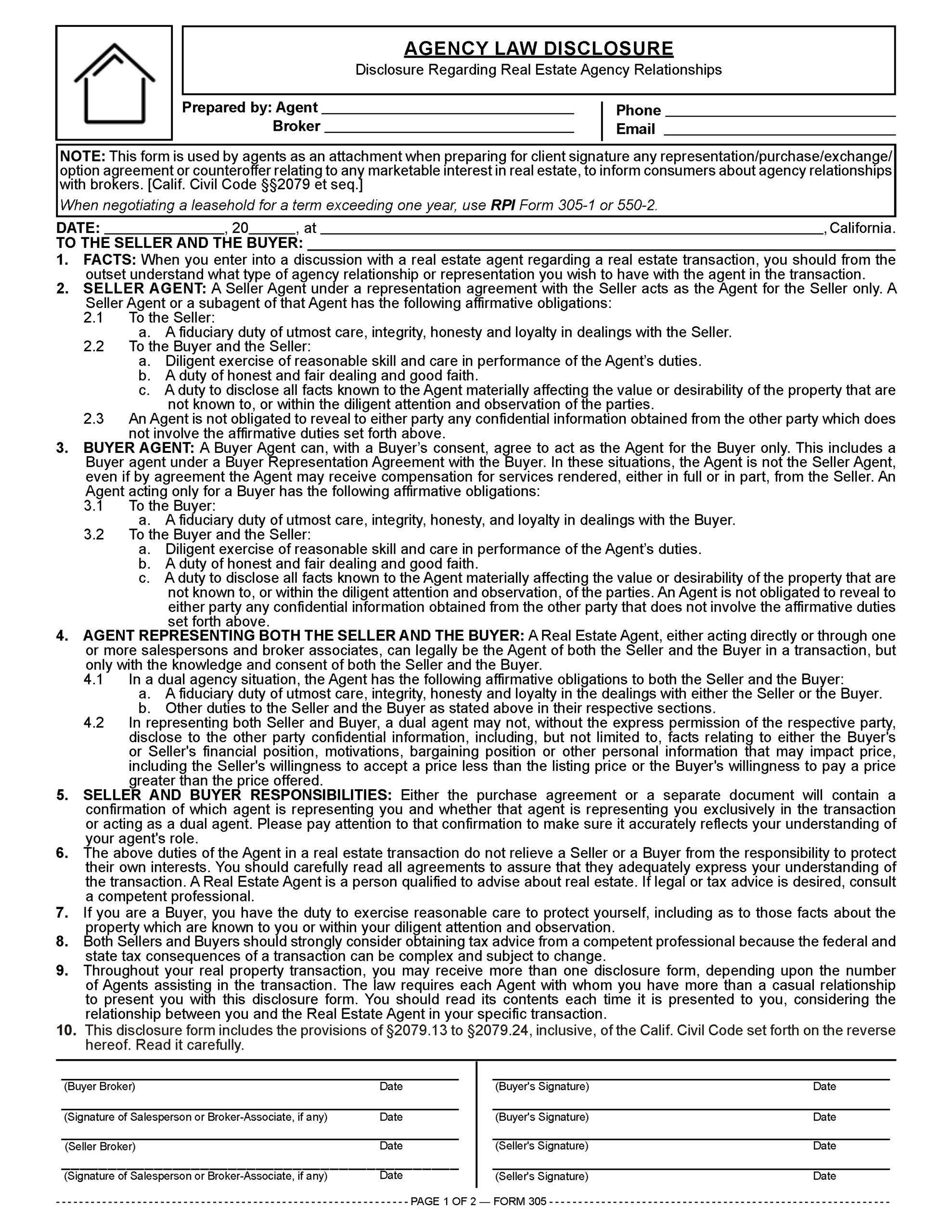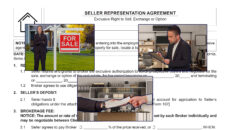This form is used by agents as an attachment when preparing for client signature any representation/purchase/exchange/option agreement or counteroffer relating to any marketable interest in real estate, to inform consumers about agency relationships with brokers. [Calif. Civil Code §§2079 et seq.]
Download the Form
Agency and legislated order
An agent is an individual or corporation who represents another, called the principal, in dealings with third persons. [See RPI e-book Real Estate Principles Chapter 2]
An agency relationship is created in a real estate transaction when a principal employs a broker to act on their behalf. [Calif. Civil Code §2307]
This agency relationship is best undertaken with a signed written employment agreement containing a fee provision. This employment contract is loosely referred to in the real estate industry as a listing agreement. [See RPI Form 102 and 103]
In creating an agency scheme, the California legislature established uniform real estate terminology and brokerage conduct covering targeted transactions.
The Agency Law Disclosure was created by the California legislature to familiarize brokers, agents and their principals with the uniform industry jargon. [See RPI e-book Real Estate Principles Chapter 3]
The Agency Law Disclosure needs to be presented to all parties when listing, selling, buying, exchanging or leasing for a term greater than one year:
- single family residential property;
- multi-unit residential property with more than four dwelling units;
- commercial property;
- vacant land;
- a ground lease coupled with improvements; or
- manufactured homes. [CC §§2079.13(j); 2079.14]
The disclosure describes the various agency roles licensees undertake on behalf of their principals and other participants in a real estate related transaction.
The Agency Law Disclosure needs to be attached to the following documents and signed by all parties in targeted transactions:
- a seller’s listing [See RPI Form 102];
- a buyer’s listing [See RPI Form 103];
- a purchase agreement [See RPI Form 150 and 159];
- an option to purchase [See RPI Form 161 and 161-1];
- an exchange agreement [See RPI Form 171];
- a counteroffer, by attachment or by reference, to a purchase agreement containing the disclosure as an attachment [See RPI Form 180];
- any letter of intent (LOI) prepared and submitted on behalf of a buyer [See RPI Form 185];
- a residential or commercial lease agreement for a term exceeding one year [See RPI Form 550 and 552 – 552-8]; and
- an offer to lease. [See RPI Form 556]
However, there are exceptions. The Agency Law Disclosure is not required on negotiations and agreements concerning:
- property management;
- financing arrangements; and
- month-to-month rental agreements.
At its core, the Agency Law Disclosure form is a restatement of pre-existing agency codes and case law on agency relationships in all real estate transactions and leases exceeding a one year term. [See RPI Form 305, 305-1 and 550-2]
To cover the distinctions in nomenclature between sales and leasing transactions, Realty Publications Inc. (RPI) publishes two different versions of the agency disclosure form to enhance comprehension.
Each version contains language engineered to best identify the participants involved in the two sets of transactions:
- the sale or exchange of any real estate [See RPI Form 305]; or
- the lease for a period exceeding one year. [See RPI Form 305-1 and 550-2]
Editor’s note — Two identical versions of the agency disclosure exist for leasing to place the form in both the “disclosure” and “property management” series of RPI forms. Either may be used when negotiating a listing, offer/letter of intent (LOI) or agreement for the lease of real estate for a period greater than one year. [See RPI Form 305-1 and 550-2]
The disclosure for sales and exchanges of real estate
The California legislature enacted the agency disclosure law to better inform the public and licensees to eliminate licensee misconceptions about the duties they owe to principals and the public’s lack of awareness. [See RPI e-book Real Estate Practice Chapter 7]
The real estate agency disclosure law addresses two separate sets of agency-related matters on real estate transactions:
- an Agency Law Disclosure, also known as the Disclosure Regarding Real Estate Agency Relationships, setting out the “rules of agency” which control the conduct of real estate licensees when dealing with the public in an agency capacity [See RPI Form 305, 305-1 and 550-2]; and
- an agency confirmation provision, contained in documents signed by principals used to negotiate the purchase of real estate or the lease of real estate for a term exceeding one year, declaring the agency relationships undertaken by each of the brokers with the participants in the transaction. [See RPI Form 150 and 550]
Relatedly, the agency confirmation provision declares the agency relationships each broker may have with the principals in the specific transaction actually underway. With the agency confirmation included in written negotiations to purchase, this relationship is consented to by all participants when they sign the documents.
The agency confirmation provision discloses each broker’s agency relationship presently existing with the participants. Further, it memorializes the relationship established by the broker’s and their agent’s conduct with the principals in a transaction. The agency relationship confirmed is the broker’s legal determination of the actual agency created by their prior and present conduct with the participants.
When two brokers are involved in a targeted transaction, each broker needs to disclose whether they are acting as the agent for the buyer or the seller. Alternatively, when only one broker is involved, they need to confirm whether they and their agents are acting as the exclusive agent for one participant or as a dual agent for both the buyer and seller.
Failure of the seller’s agent to provide the seller with the Agency Law Disclosure prior to entering into the listing agreement is a violation of disclosure laws. [CC §2079.14(a)(1)]
When the broker or their sales agent fails to hand the seller the Agency Law Disclosure at the listing stage, the listing, and thus the agency, can be cancelled by the seller at any time. When the Agency Law Disclosure is not delivered up front with the listing, the seller may cancel payment of the fee due their broker after the transaction is in escrow and the brokerage fee has been further agreed to. [Huijers v. DeMarrais (1992) 11 CA4th 676]
Similarly, the buyer’s agent provides the Agency Law Disclosure form to the buyer prior to their signing any writing that initiates negotiations contemplating a sale. [CC §2079.14(a)(2)]
As a matter of good practice, the disclosure form is best provided to and signed by the buyer when entering into a buyer’s listing agreement, as this is the moment affirmative agency duties commence. [See RPI Form 103]
The contents of the Agency Law Disclosure for sales or exchanges
An agent uses the Agency Law Disclosure — For Negotiating the Sale or Exchange of Real Estate published by RPI as an attachment when preparing a listing agreement, purchase agreement or a counteroffer on the sale or exchange of residential property, commercial property or mobilehomes. The disclosure is used to comply with agency disclosure law controlling the conduct of real estate licensees when in agency relationships. [CC §§2079 et seq.; See RPI Form 305]
The Agency Law Disclosure was created for use by brokers and their agents to educate and familiarize principals with:
- a uniform jargon for real estate transactions; and
- the various agency roles licensees undertake on behalf of their principals and other participants in a real estate transaction.
This information is presented in a two-page form. The exact wording of its content is dictated by statute. [See RPI Form 305]
The statutorily controlled Agency Law Disclosure — For Negotiating the Sale or Exchange of Real Estate contains:
- Facts encouraging the seller or buyer to understand what type of agency relationship they want to have with the agent in the transaction [See RPI Form 305 §1];
- Seller’s Agent expectations [See RPI Form 305 §2];
- Buyer’s Agent expectations [See RPI Form 305 §3];
- Dual Agent expectations [See RPI Form 305 §4];
- Seller and Buyer Responsibilities [See RPI Form 305 §§5 through 9];
- Provisions of the controlling laws [CC §2079.13 to §2079.24; See RPI Form 305 §10]; and
- Signatures of the buyer, seller, buyer’s broker, seller’s broker and any agents or broker-associates assisting the buyer or seller. [See RPI Form 305]
Form navigation page published 07-2015. Updated 06-2025.
Form last revised 2025 to conform with language changes for best broker practices.
Form-of-the-Week: Agency Law Disclosure — For Sales, Exchanges and Leases Greater Than One Year — Forms 305, 305-1 and 550-2
Form-of-the-Week: Agency Law Disclosure For Leases Greater Than One Year — Forms 305-1 and 550-2
Book: Real Estate Principles Chapter 3: The agency law disclosure
Book: Real Estate Practice Chapter 7: The agency law disclosure
Letter to the Editor: What is an agency relationship?
Change the Law: Apply use of the Agency Law Disclosure to all property transactions
Client Q&A: What is the Agency Law Disclosure and when is it handed to the seller?
Word-of-the-Week: Agency Law Disclosure








